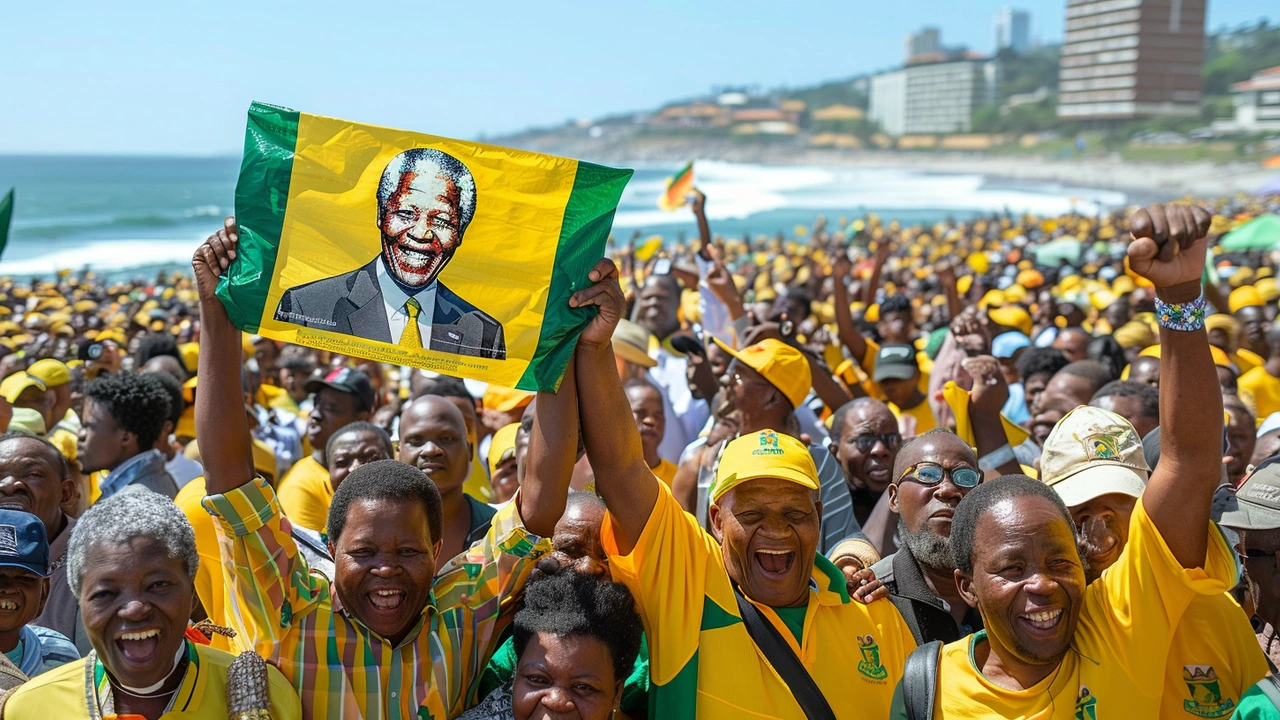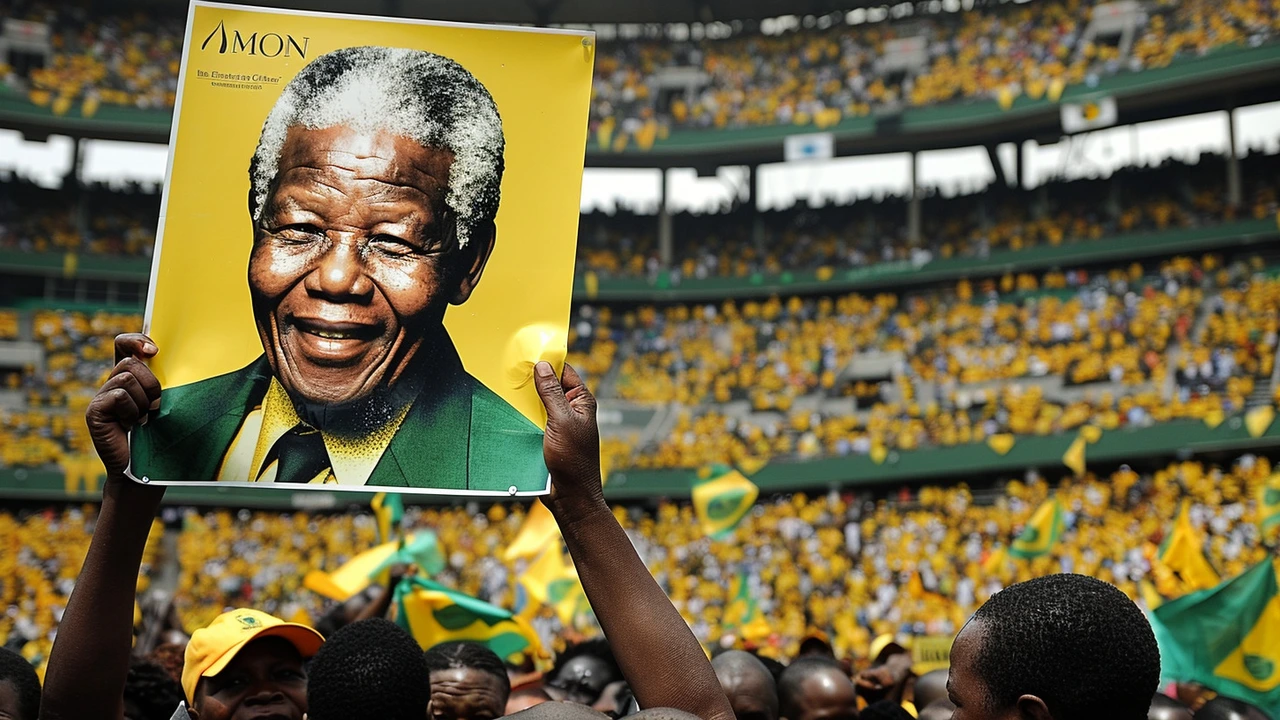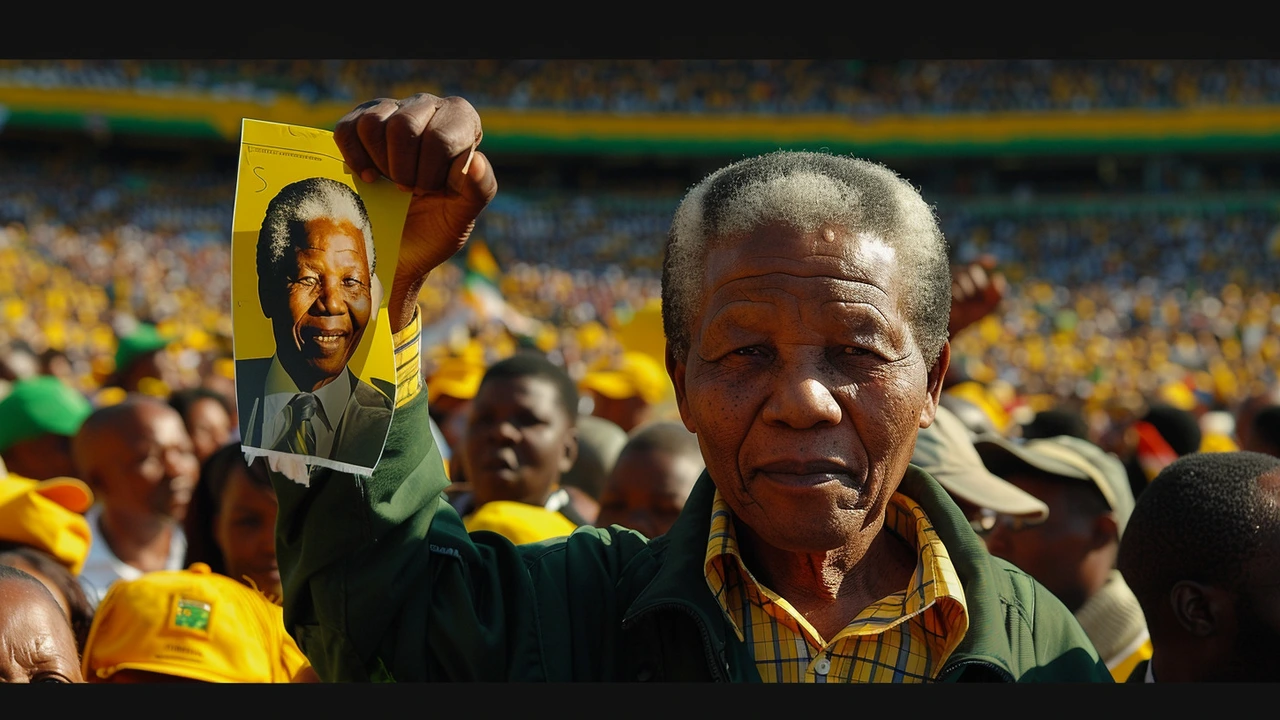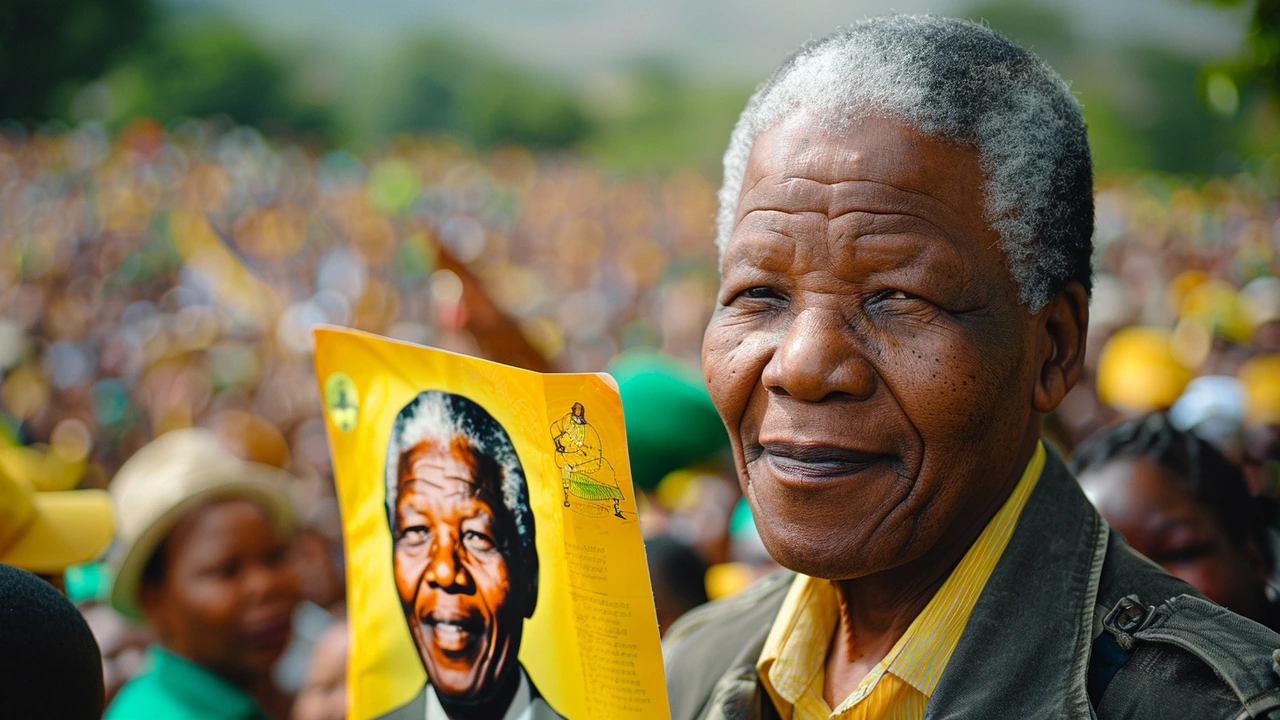Historic Shift: Nelson Mandela's ANC Loses Majority in South African Elections Amid Unemployment and Corruption Concerns

Introduction
In an unprecedented shift in South African politics, Nelson Mandela's African National Congress (ANC) has lost its majority standing in the latest elections. Securing a mere 40.2% of the votes, this marks the first time since 1994 that the ANC has fallen below the majority threshold. The development underscores a growing wave of dissatisfaction among South Africans, spurred by a combination of high unemployment rates, economic inequality, and rampant corruption.
The Rise and Fall of the ANC
The ANC has held a dominant position in South African politics since Nelson Mandela was elected the country's first Black president in 1994. This victory heralded a new era of racial equality and democracy, one that promised to uplift the downtrodden and bridge the economic disparities fostered under apartheid. However, this vision has become increasingly tarnished over the past few decades. Widespread corruption, lack of adequate public services, and persistent economic woes have left many South Africans disillusioned. Unemployment stands officially at 32.9%, although many believe the real figure to be far higher. This statistic is a stark reminder of the economic stagnation and lack of opportunities that plague vast segments of the population.

Root Causes of Discontent
Multiple factors have contributed to the ANC's loss of majority. Chief among these is the high unemployment rate, which has left millions of South Africans struggling to secure stable employment. Adding to the frustration are persistent economic disparities, with a significant portion of the population living in dire poverty. Corruption scandals have also plagued the ANC, eroding public trust in a party once seen as the champion of the common people. The public's frustration is exacerbated by inadequate public services in impoverished areas, daily power outages, and an alarming crime rate. On average, South Africa witnesses 130 murders and 80 rapes daily, making safety a major concern for its citizens.
Election Outcomes
Aside from the ANC's dramatic decline, the Democratic Alliance (DA) secured 21.8% of the votes, making it the second-largest party. The DA has its origins in a merger between former apartheid rulers and liberal whites, which gives it a complicated legacy but also a broad appeal. Meanwhile, the uMkhonto we Sizwe (MK), led by former president Jacob Zuma, garnered 14.9% of the votes. The Economic Freedom Front (EFF), another significant entity in South African politics, finished in fourth place with 9.5% of the votes. These results signify a more fragmented electoral landscape, one where no single party holds overwhelming sway.

Path Forward: Potential Coalitions
The ANC now faces the daunting task of forming a coalition government. This could either involve creating a partnership with a smaller party or establishing a government of national unity. Potential coalition partners include the DA, EFF, or MK, each bringing their distinct ideologies and political goals to the table. A coalition government could offer a fresh start for South Africa, a chance to address the myriad challenges plaguing the nation. However, the success of such a government will depend largely on its ability to build consensus and prioritize the needs of all South Africans.
Voting Sentiments
Despite the numerous challenges, the recent election was largely peaceful. This is a testament to the resilience of South Africa's democratic institutions, which have weathered many storms over the years. Voter turnout was lower than in previous elections, which some attribute to widespread disillusionment with the political process. Nevertheless, those who did vote made it clear that they desire change. They seek leaders who can deliver tangible improvements in their daily lives, from job creation and economic growth to enhanced public safety and better services.
Future Prospects
The next 15 days will be particularly crucial for South Africa as political parties negotiate the terms of a new government. These negotiations will determine not just the makeup of the coalition, but also its policy priorities and governance style. There is hope that a government of national unity could facilitate a reset, enabling South Africa to tackle its pressing issues more effectively. However, the road ahead is fraught with difficulties, and much will depend on the ability of the soon-to-be-formed government to restore public faith in political leadership.
The Role of International Community
As South Africa embarks on this delicate political transition, the role of the international community cannot be overlooked. Global stakeholders have a vested interest in the country's stability and prosperity, given its strategic importance in the African continent. International observers have hailed the peaceful nature of the elections, and many stand ready to assist in the post-election phase. Whether through economic aid, investment initiatives, or diplomatic support, the international community will play a key role in supporting South Africa's democratic and economic development.

Conclusion
In the wake of this historic election, uncertainties abound. Yet, there is also a sense of cautious optimism. While the ANC’s loss marks the end of an era, it also opens the door for new political dynamics that could benefit South Africans in the long term. As the nation waits for the formation of a new government, the hope is that this moment will catalyze meaningful change. It is a pivotal time, one that requires strong leadership, inclusive policies, and a commitment to addressing the deep-rooted challenges facing the nation. The next few days and weeks will be telling, but for now, South Africans hold on to the hope of a brighter future.
7 Comments
mary oconnell
So, the ANC’s tumble from a hegemonic stronghold to a coalition‑dependent entity is a textbook case of systemic inertia colliding with socioeconomic entropy, isn’t it? The irony of a liberation movement now grappling with the very bureaucratic malaise it once condemned is almost poetic, if you enjoy bleak metaphors. Yet, amidst the despair, there’s an inclusive call for a more pluralistic polity that could actually leverage diverse expertise. One could argue that the electorate is finally exercising its latent agency, demanding accountability beyond nostalgic loyalty. Of course, the real question is whether the nascent alliances will translate this kinetic energy into substantive policy, or simply become another veneer of political theater. In the end, the saga serves as a cautionary tale about the perils of complacency in post‑revolutionary governance.
Michael Laffitte
Man, reading that overview is like watching a drama unfold in real time-lights dim, curtains rise, and the lead actors finally admit they’ve been improvising all along! I can’t help but feel a surge of hope that this shattered majority forces everyone to actually listen to the cries from the townships, not just the echo chambers of parliament. The coalition talks could be the crucible that forges a government truly attuned to ordinary folks, and that vision fuels my optimism to the point of theatrical applause. Let’s just hope the parties remember they’re not auditioning for a sequel, but trying to script a sustainable future.
sahil jain
The data on unemployment and crime rates underscores a systemic shockwave that the ANC can no longer absorb without fundamental restructuring. By examining the macroeconomic indicators, we see a clear correlation between governance deficits and the erosion of public trust. It’s crucial to mobilize cross‑sectoral expertise, integrating fiscal reforms with social welfare programs to address the root causes. Moreover, regional stakeholders must coordinate to reinforce infrastructure, thereby stimulating job creation. A holistic approach, rather than partisan point‑scoring, will be the catalyst for genuine recovery.
Bruce Moncrieff
Totally mind‑blowing how the political tides shift overnight.
Dee Boyd
From an ethical standpoint, the collapse of the ANC’s dominance reveals a moral deficit that has been festering beneath the surface of South African politics for decades. When we analyze the fiduciary obligations of elected officials, it becomes evident that the rampant corruption constitutes a breach of the social contract, thereby justifying the electorate’s repudiation. The rhetoric of unity, often employed as a veneer, has been weaponized to perpetuate systemic inequities, especially in marginalized communities. Consequently, the demand for transparent governance is not merely a political preference but a categorical imperative rooted in distributive justice. The trajectory ahead must therefore be anchored in an uncompromising commitment to ethical stewardship, lest the nation regress further into disenfranchisement.
Carol Wild
One cannot overlook the subtle threads of clandestine influence that have, for years, been woven into the fabric of the ANC’s decision‑making apparatus, a fact that mainstream narratives deliberately obfuscate. The pattern of offshore accounts, masked beneficiaries, and phantom NGOs creates a labyrinthine network that siphons resources intended for public welfare into the coffers of an elite few, fueling a conspiracy of silence that the media has been complicit in perpetuating. Moreover, the strategic placement of loyalists in key ministries ensures that any reformist agenda is systematically diluted, preserving the status quo under the guise of democratic process. These mechanisms operate not merely as isolated incidents but as components of a coordinated strategy to maintain hegemony over the populace. Adding to this, the infiltration of intelligence services into civil society groups has suppressed dissent, turning potential watchdogs into extensions of the state apparatus. The recent election results, therefore, can be interpreted as a seismic pushback against this covert domination, a collective awakening that the citizenry can no longer be pacified by superficial gestures. Yet, the entrenched networks possess a resilience that is often underappreciated; they adapt, mutate, and reemerge in novel configurations, making the fight for genuine transparency an ongoing frontier. It is essential, then, for observers to maintain a vigilant stance, interrogating official narratives and scrutinizing financial trails that the establishment prefers to keep hidden. While the specter of conspiracy may appear hyperbolic to some, the empirical evidence of recurring anomalies lends credence to the hypothesis of a deep‑state symbiosis. In practical terms, civil disobedience, investigative journalism, and international oversight must converge to dismantle these shadow structures. Failure to do so risks consigning South Africa to a perpetual loop of superficial democratic rituals devoid of substantive change. Ultimately, the nation's future hinges on its ability to expose, confront, and eradicate these insidious forces before they entrench themselves further into the core of governance.
Rahul Sharma
In addressing the economic malaise that underpins the ANC’s electoral decline, one must first acknowledge, with unequivocal certainty, that policy paralysis has been exacerbated by a chronic misallocation of fiscal resources, a phenomenon that is, frankly, indefensible; second, the persistent power outages, colloquially termed load‑shedding, have crippled industrial output, thereby reinforcing a vicious cycle of unemployment, which, in turn, fuels social unrest, and this feedback loop must be broken immediately. Moreover, the integration of renewable energy initiatives, which have been touted as a panacea, remains hampered by bureaucratic inertia, an observation supported by multiple independent audits, and such inertia cannot be tolerated in a nation striving for prosperity. Additionally, the recent surge in foreign direct investment, while statistically promising, is contingent upon the establishment of a stable legal framework, one that guarantees property rights, enforces anti‑corruption statutes, and provides transparent procurement processes; without these safeguards, investor confidence devolves into skepticism. Furthermore, the education sector, a critical driver of long‑term economic health, suffers from underfunding, curriculum misalignment, and brain drain, issues that must be remedied through comprehensive reforms, increased public spending, and strategic partnerships with the private sector. The healthcare system, too, demands urgent attention, as its deficiencies exacerbate productivity losses, inflating social welfare costs, and eroding public trust, a triad that cannot be ignored. The role of civil society, often understated, is pivotal in monitoring governmental accountability, and its empowerment through legal protections, funding, and capacity building is indispensable for a resilient democracy. Lastly, the international community, while offering goodwill, must condition assistance on measurable governance benchmarks, thereby ensuring that aid translates into tangible benefits rather than becoming a conduit for patronage. In sum, the pathway to recovery is not a simplistic reallocation of funds, but a multifaceted strategy, encompassing institutional reforms, stakeholder engagement, and unwavering political will; any deviation from this comprehensive blueprint risks perpetuating the very maladies that have led to the current crisis.

Write a comment